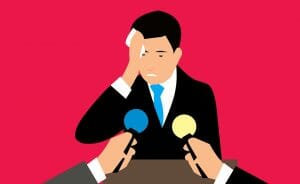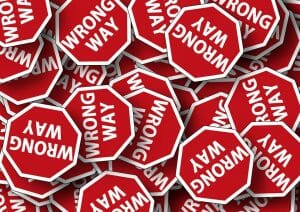“Utopia & Dystopia” est l’une des notions abordées dans l’enseignement de spécialité du programme d’anglais. Voici une fiche pour t’aider à comprendre ce thème et l’illustrer par des exemples concrets. D’ailleurs, il y a déjà une fiche sur les utopies pour l’enseignement commun juste ici avec d’autres exemples pour être incollable sur le sujet !
Definition of utopia and dystopia
The term utopia was first used by the British writer Thomas More in his book of fiction Utopia in the 16th century. Utopia refers to the creation of an imaginary world which is completely idyllic. In other words, utopian authors imagine the perfect society in which all people live in harmony. On the other side, dystopia is all about pessimism and often warn us about the potential drifts of an ideology or a situation. A dystopian work depicts an imaginary society ruled by a totalitarian power or an adverse ideology.
Utopia and dystopia show our need to understand the world we live in, transform it and reinvent it. Here, imagination offers an altered reflection of reality as to better think our own world.
Relevant examples you can use to talk about utopias
The Frenchy : Candide: or The Optimist by Voltaire, 18th century
This example is a great example to show what characterises utopia.
This philosophical tale relates the story of Candide, a young man who travels the world to find his loved one Cunégonde after being chased out of the castle he spent his childhood in. At some point, Candide wanders into El Dorado, an isolated country where the streets are covered with precious stones. There, he finds all the distinctive features of utopia: wealth and luxury, abundance, happiness and pleasure, politeness and manners. In other words, El Dorado is an example of a utopia.
The original: the urban concept of Franck Lloyd Wright
This example is interesting because it presents a utopia anchored in reality, the US territory and architecture offers an original and different approach to utopia.
Franck Lloyd Wright was an American architect who developed a utopian concept of urbanisation in the 1930s called Broadacre City. He developed his ideas in a particular context. Indeed, the 1929 financial crisis which destroyed the US economy (and the world’s economy) and increased drastically unemployment. In his utopian vision, the perfect modern city is poorly densified and respect the surrounding nature and more importantly, each citizen is guaranteed one acre of land. His vision of utopia is linked to the notion of individualism, independence and the protection of nature.
An in-between example: Brave New World by Aldous Huxley, 1932
This illustration is interesting because it can serve to criticize utopia and as an example of dystopia on scientific drifts.
Aldous Huxley was a British writer.
Brave New World (Le Meilleur des mondes en français), depicts a futuristic society, the World State, in which huge scientific progress has been achieved in reproductive technology, psychological manipulation and conditioning. People are split into different castes based on intelligence and are kept peaceful by the constant administration of a happiness-producing drug. The disadvantaged citizens have no sense of injustice about their lives in comparison to the privileged inhabitants so they all live in harmony.
Here, the author implicitly makes a satire of the idea of utopias: the citizens are happy, just like in a utopia, but they have an empty life. There is no art to be found, nor history, religion or familial ties. The requirement to use the drug to keep the citizens happy shows that this utopia is artificial. So Brave New World can be used as a dystopia with the drifts of technological advances or as a satire of utopias.
Relevant examples you can use to talk about dystopias
On technological drifts: The Circle by Dave Eggers, 2013
This book is the perfect example to talk about a topical subject: the influence of tech giants and technological drifts.
Daves Eggers is an American writer.
This novel tells the story of Mae Holland, a young graduated woman who just got a job at her dream firm: the Circle. The Circle a powerful American multinational of the digital sector. It is a sort of a merger of the GAFA (Google, Apple, Facebook, Amazon), these tech giants based in Silicon Valley.
At first, the novel depicts a society quite similar to the current American society. But little by little, the company becomes more and more influential, technological advances accelerate and soon, the Circle advocates total transparency: so as knowledge is accessible to all people, at all moment, each person has to share their life with the rest of the world. Everybody starts wearing a camera, sharing their smallest deeds and gestures live. The process goes so far as to interfere with the US political sphere.
Between addiction to social media, the loss of social links and private life, this novel questions the growing influence of these digital giants, our relation to technologies and the drifts their use can trigger.
A dystopian novel and series: The Handmaid’s Tale
This example will give you a glimpse of how the current US society could turn into a totalitarian regime in the twinkling of an eye. Et Cette oeuvre est au programme de terminal pour 2020-2021 !
The Handmaid’s Tale is a novel by Canadian writer Margaret Atwood which was then adapted into a TV series.
In The Handmaid’s tale, Margaret Atwood imagines a near future and a world not very different from our own. The scene is set in the USA. In fact, she satirizes the tendencies she observed in the 1980s: poor treatment of women, infertility, disease, corruption of religion… She shows the potential consequences of the growing influence of political groups who favour the restriction and control of women’s sexuality and how it could entail the birth of a totalitarian regime.
You can link this example with various demonstrations against the oppression of women, especially protest in favour of abortion. Indeed, the characteristic red-and-white costume worn by women in The Handmaid’s Tale has become a symbol in feminist protests across the world, including the USA.
How to use these examples during your exam?
Example of a subject : Thématique “Imaginaires”
Here, you are asked to analyse how the documents deal with the themes of surveillance and privacy. The first document is an extract of 1984 by George Orwell, one of the classic dystopias. The core and the famous sentence is certainly “Big Brother is watching”.The verb watch and the image if the staring eyes in the third document are also essential. To answer the question you can also analyse who controls the surveillance: the government, the police, a totalitarian regime, tech giant… And when surveillance is expanding, privacy is fading. The second document focuses on all the personal data our smartphones gather without us even noticing for instance. Try to put a stress on all the elements which show that there is a breach of privacy.
Utopia and dystopia : some useful vocabulary
- utopie : utopia
- dystopie : dystopia
- négatif : adverse
- dérive : drift
- reflet : reflection
- déformé, altéré : altered
- trait caractéristique : distinctive feature
- le luxe : luxury
- le savoir-vivre : manners
- flâner, déambuler : to wander
- le numérique : digital technology / digital
- une avancée / une découverte importante : a breakthrough
- les réseaux sociaux : social media
- s’immiscer dans qqch : to interfere in sth
- un futur proche : a near future
- faire la satire de : to satirize sth
- entraîner, causer / impliquer : to entail
- une manifestation : a demonstration
- être sous étroite surveillance : to be under close surveillance
- une violation de vie privée : a breach of privacy
NB : le nom progress est invariable
S’intéresser à l’utopie et la dystopie te permettra, en plus d’accroître ta culture générale, de te questionner sur la société actuelle et de faire travailler ton esprit critique tout en te divertissant.
Et si tu veux travailler l’oral d’anglais et la méthodologie de cette épreuve, cet article pourra sûrement t’aider : La méthode pour réussir son oral d’anglais – Up2School











